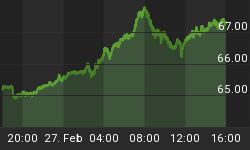As stocks markets around the world rise to record highs, even former Fed Chairman Alan Greenspan could not refrain from raising concerns about surging Chinese stocks. Lest we forget, Greenspan is on record for declaring the impossibility of spotting a bubble before it bursts. But in the few times that he has violated his own credo, his vision has proven invariably faulty. Not only did he warn of irrational exuberance in the U.S. just before a five-fold increase in the NASDAQ, but he became one of the markets biggest boosters once the market peaked. Based on his track record, I interpret his statements as a screaming buy signal for Chinese stocks.
However, the larger issue is whether the world's renewed love affair with stock investing is rational. From my perspective it certainly is, but not for the reasons most analysts believe. My guess is that common stocks have become the inflation hedge of choice. With the global growth in the money supply at record pace, reaching into annual double-digit growth in just about every nation, cash has indeed become trash. With so much cash sloshing around, pushing asset and commodity prices up everywhere they are accurately measured, preservation of purchasing power is now of primary concern. For most investors common stocks seem like the best way to achieve it.
Nowhere is this dynamic more visible then in China. With annual money supply growing at close to 20% per year, it's no wonder that the Chinese do not want to hold any yuan! They would rather convert their yuan into something more tangible before their government prints any more. However, although it does not get as much press, the phenomenon is even more evident in Zimbabwe, where money supply growth and stock market performance are both the highest in the world. This despite the fact the Zimbabwe economy is world's weakest. The only practical alternative for Zimbabweans, who can't get out of the country, is to buy stocks as soon as they get any cash.
The persistent weakness in bonds and corresponding recent rise in interest rates further supports my point. Investors are getting out of cash and bonds (which merely represent future payments of cash) in favor of tangible assets such as equities. The fact that rising interest rates are ultimately negative for stocks is conveniently ignored, as the race to get out of cash trumps all else. In the U.S., the yield on the 10-year Treasury has backed up 25 basis points in the last three weeks. If yields rise above 5% on this move, which looks very likely, momentum should take yields to 5.25% before the end of June. There will be some resistance there, but look for 10-year yields to breach 5.5% before the end of the summer. Once that level is taken out, I expect a move above 6% to happen very quickly, perhaps even before the year ends. Is it just me, or does this seem eerily familiar to the summer of 1987?
Ultimately, rising interest rates will eventually exact a toll on stocks, especially here in the United States. As the world's largest debtor nation, America will suffer disproportionately from rising interest rates, as we are on the paying end of the transactions. Also, given the proliferation of short-term debt and adjustable-rate mortgages, this burden will become increasingly difficult to bear. As the U.S. economy falls into recession, with interest rates and consumer prices continuing their ascents, corporate earnings will suffer, causing stock market investors to seek out other inflation hedge alternatives, particularly gold.
For those who are impressed by the recent global stock market rally, wait until you see what will happen to the price of gold. As the old saying goes, there is no rush like a gold rush, and this one will be a stampede. Got gold?
For a more in depth analysis of the tenuous position of the Americana economy and U.S. dollar denominated investments, read my new book "Crash Proof: How to Profit from the Coming Economic Collapse." Click here to order a copy today.
More importantly make sure to protect your wealth and preserve your purchasing power before it's too late. Discover the best way to buy gold at www.goldyoucanfold.com, download my free research report on the powerful case for investing in foreign equities available at www.researchreportone.com, and subscribe to my free, on-line investment newsletter at http://www.europac.net/newsletter/newsletter.asp.















